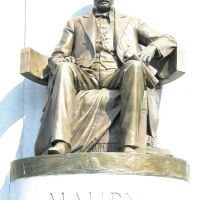
The most attacked book of the Bible has always been Genesis.
A major thrust of the attack is the claim that Adam never existed. Those who think that mankind evolved over millions of years believe that Adam and Eve are mythical and have no place in human history.
Today scholars from within and without Christendom dispute the literal understanding of Genesis with unrelenting insistence. For example, Dr. Peter Enns, former tenured professor of Old Testament at Westminster Theological Seminary, argues in his book The Evolution of Adam that Adam is not historical. Enns makes some outrageous claims:
“Our thinking about Adam must change . . . I am arguing that our understanding of Adam has evolved over the years and that it must now be adjusted in light of the preponderance of (1) scientific evidence supporting evolution and (2) literary evidence from the world of the Bible that helps clarify the kind of literature the Bible is.”
“A historical Adam has been the dominant Christian view for two thousand years. We must add, however, that the general consensus was formed before the advent of evolutionary theory . . . Evolution demands that the special creation of the first Adam as described in the Bible is not literally historical.”
(Enns, Peter. The Evolution of Adam: What the Bible Does and Doesn’t Say about Human Origins. Brazos Press. 2012. p. xiii, xvi)
Is it possible that Adam is only figurative as Enns believes?
Is it possible that Adam never really existed?
The most theologically astute New Testament author is probably the apostle Paul. What did Paul think about Adam?
Paul Believed in Adam!
The Apostle Paul mentions Adam by name in several New Testament passages:
Therefore, just as through one man sin entered into the world, and death through sin, and so death spread to all men, because all sinned — for until the Law sin was in the world, but sin is not imputed when there is no law. Nevertheless death reigned from Adam until Moses, even over those who had not sinned in the likeness of the offense of Adam, who is a type of Him who was to come.
But the free gift is not like the transgression. For if by the transgression of the one the many died, much more did the grace of God and the gift by the grace of the one Man, Jesus Christ, abound to the many. The gift is not like that which came through the one who sinned; for on the one hand the judgment arose from one transgression resulting in condemnation, but on the other hand the free gift arose from many transgressions resulting in justification. For if by the transgression of the one, death reigned through the one, much more those who receive the abundance of grace and of the gift of righteousness will reign in life through the One, Jesus Christ.
So then as through one transgression there resulted condemnation to all men, even so through one act of righteousness there resulted justification of life to all men. For as through the one man’s disobedience the many were made sinners, even so through the obedience of the One the many will be made righteous. The Law came in so that the transgression would increase; but where sin increased, grace abounded all the more, so that, as sin reigned in death, even so grace would reign through righteousness to eternal life through Jesus Christ our Lord.
(Romans 5:12-21 NASB)For since by a man came death, by a man also came the resurrection of the dead. For as in Adam all die, so also in Christ all will be made alive.
(1 Corinthians 15:21-22 NASB)So also it is written, “The first man, Adam, became a living soul.” The last Adam became a life-giving spirit. However, the spiritual is not first, but the natural; then the spiritual. The first man is from the earth, earthy; the second man is from heaven.
(1 Corinthians 15:45-47 NASB)But I do not allow a woman to teach or exercise authority over a man, but to remain quiet. For it was Adam who was first created, and then Eve. And it was not Adam who was deceived, but the woman being deceived, fell into transgression.
(1 Timothy 2:12-14 NASB)
In Romans 5 and 1 Corinthians 15, Paul draws a parallel between two representatives of the human race, Adam and Jesus. Jesus is historical, and thus Adam must be historical also for the parallel between the two to be meaningful. It would not make sense for one part to be historical and the other symbolic.
Paul teaches that death is the result of sin and that sin entered into the world through Adam. If Adam were mythical, then the sin that entered through him could only be mythical. And mythical sin could only produce mythical death. But it is obvious that death is real. Therefore, according to Paul’s argument, Adam must be real. A non-historical Adam destroys Paul’s argument.

Paul believed in a historical Adam. For Paul, Adam was historically the first human. For Paul, sin entered the world through Adam. Sin cannot enter through a figurative, symbolic, or mythical man.
Paul is clear that Adam was the first man (1 Corinthians 15:45) and Eve the first woman (1 Corinthians 15:45; 1 Timothy 2:13-14; Genesis 3:20).
Paul also referred to Adam in his sermon to the pagan Greeks of Athens:
“He made from one man every nation of mankind to live on all the face of the earth.” (Acts 17:26)
Paul saw Adam as the literal father of the entire human race. He included this fact in his evangelistic appeal to pagans who were completely ignorant of Biblical history. Even though Greek thought has no tradition of mankind being descended from a single man, still Paul did not avoid this truth in preaching to the Greeks. Likewise, we should not hesitate to be explicit about the truth of Adam and Creation in speaking to the evolutionary culture in which we live.
The Apostle Paul, speaking with the authority of Jesus Christ who commissioned him to teach on His behalf, gives the definitive interpretation of the Adam account: Paul presents Adam as a real man. For Paul, the gospel of Jesus Christ is vitally connected to an actual historical choice of disobedience by Adam which is redeemed by the obedience of the second Adam.
Christians must accept the testimony of Moses, Jesus, and Paul that Adam was a real man, the literal father of the entire human race. We are all biological sons and daughters of Adam.
Questions to Ponder
- What are the ramifications of not believing in Adam?
- Is trading Adam for Evolution a good trade on a scientific level? On a Biblical level?
Share your thoughts on these questions in the comments below. It could encourage or help another reader.
Soli Deo Gloria.
This is the fourth of a series of weekly blog articles on Adam.
Read the prequels:
1. Was Adam in the Garden of Eden?
2. Did Moses Believe in Adam?
3. Did Jesus Believe in Adam?
Read the sequels:
5. Does Belief in Adam Matter?
6. Adam and Puppies
7. Why Did Adam Sin?
8. What Should Adam Have Done?
9. What Did Adam Cause?
10. What Was Adam’s Forbidden Fruit?
11. How Long Was Adam in Eden?
12. Was Adam’s Garden of Eden Real?
13. Christmas & Adam (with videos)
14. Where Was Adam’s Garden of Eden?
15. Did Adam Wear Clothes in Eden?
16. Was Adam Backward or Brilliant? (with video)
17. Who Was Mrs. Adam?
18. Adam’s Dream Girl
19. Adam’s Prolific Princess
20. Adam’s Problematic Princess
21. How Many Children Did Adam Have?
22. Whom Did Adam’s Sons Marry?
23. Did Adam Ride a Unicorn?
24. How Long Did Adam Live?
25. Did Adam Swat Mosquitoes in Eden?
26. Did Adam’s Garden Have a Talking Snake?
27. Why Should Adam’s Sin Affect Me?
28. Did Roses Have Thorns in Adam’s Garden?
29. Adam the Image-Bearer & Harambe the Gorilla
30. Did Adam Ever Return to Eden?
31. What Was Adam’s Tree of Life?
32. Will Adam Be in Heaven?
33. Did Adam See the Big Dipper?
34. Did Adam Know Earth Is Round?
35. Did Jesus Say When Adam Was Created?
36. Did Adam See Dinosaurs?
37. Did Adam Like Steak?
38. Could Adam Read & Write?
39. Did God Use Evolution to Make Adam?
40. Adam & the Olympics
41. Adam and the Gospel
42. Adam and the Genesis Road
Subscribe – Don’t miss future blog posts!
Click the sidebar’s “SUBSCRIBE” button to follow the
Bible-Science Guy Blog. You’ll automatically receive
new posts free by email. Click SUBSCRIBE NOW!
©William T. Pelletier, Ph.D.
“contending earnestly for the faith”
“destroying speculations against the knowledge of God”
“for the defense of the gospel”
(Jude 1:3; 2 Cor 10:5; Phil 1:16)
Wednesday October 14, 2015 A.D.
The Lord God commanded the man, saying, “From any tree of the garden you may eat freely; but from the tree of the knowledge of good and evil you shall not eat, for in the day that you eat from it you will surely die.” (Genesis 2:16)
Now the serpent was more crafty than any beast of the field which the Lord God had made. And he said to the woman, “Indeed, has God said, ‘You shall not eat from any tree of the garden’?” The woman said to the serpent, “From the fruit of the trees of the garden we may eat; but from the fruit of the tree which is in the middle of the garden, God has said, ‘You shall not eat from it or touch it, or you will die.’” The serpent said to the woman, “You surely will not die! For God knows that in the day you eat from it your eyes will be opened, and you will be like God, knowing good and evil.” When the woman saw that the tree was good for food, and that it was a delight to the eyes, and that the tree was desirable to make one wise, she took from its fruit and ate; and she gave also to her husband with her, and he ate. (Genesis 3:1-6)





























Thank you for great post! It mirrors my post on Adam being a historical figure.
LikeLiked by 1 person
By: Historicus on October 19, 2015
at 6:13 pm
If the fall did not take place then why would we need a Savior? Could this be a reason that so many from the visible church discount sin, our Savior, and His mighty work on our behalf. Great post. God bless you.
LikeLike
By: Eliza on November 26, 2015
at 2:44 am